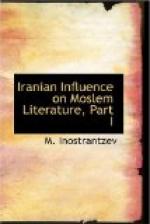is transient. Life is like a statue with several
limbs. When properly adjusted each in its right
place, they hold themselves together on a single pivot
but which, when the latter is taken off, fall to pieces.
O soul, do not deceive thyself owing to intercourse
with friends and companions and do not strain thyself
after it, inasmuch as this intercourse brings no doubt
joy but also much hardship and tribulation and finally
ends in separation. It is like a ladle which
men use for hot soup, so long as it is new but when
it breaks they have done with it—burn it.
O soul, allow not thyself to be moved by family and
relations to amass property for them so that thyself
should perish. Thou shouldst, then, be like fragrant
incense which is burnt only for the enjoyment of others.
They are like a hair which men cherish so long as
it remains on the head but cast it off as impure as
soon as it falls. O soul, be steadfast in treating
the diseased and give it not up because thou findest
that the physician’s profession is arduous and
people do not recognise its uses and high value.
Judge only thyself whether a man who cures in another
a disease making him feel once more fresh and whole
is not worthy of a great reward and handsome remuneration.
This is the case with one who has solicitude for a
single individual; how much more then is this so in
the case of a medicineman who for meed in the next
world thus acts towards a, large number of men, so
that they after torturing pains and maladies, which
shut them out from the enjoyment of the world, from
food and drink, wife and child, feel once more as
well as ever before. Who indeed merits larger
reward and nobler retribution? O soul, do not
put away from thy sight things of the next world because
thou hungerest after passing life. For thou,
in thy haste to acquire a triviality surrenderest
the valuable; and such people are in the position of
the merchant who had a house full of aloe wood and
who said, “If I were to sell this by weight
it would take me too long” and therefore gave
it away wholesale for a trifling price.
[Sidenote: Autobiographical]
After thus I had replied to my soul and thereby explained
matters to it and guided it aright it could not deviate
from truth, yielded to righteousness and abandoned
what it was inclined to. Accordingly I continued
to treat the sick for the sake of my reward in the
next world. This, however, by no means prevented
my acquiring a rich portion of earthly goods before
my journey to India as well as after my return from
the kings, and that was more than I was ambitious of
or had hoped for, for a man in my position and my
calling.
[Sidenote: Limitations of the healing art.]
Thereafter I again reflected on the healing art and
found that the physician can employ no remedy for
a suffering patient which so completely cures his
disease that it does not attack him again or that
he is immune from a worse disorder. While, therefore,
I was unaware how I could effect a perfect cure secure
against the recurrence of a disease, I saw that on
the other hand acknowledge of the next world was a
permanent absolute protection against all distempers.
Accordingly I conceived a contempt for the healing
art and a longing for religious knowledge.




